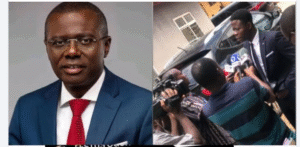Lagos Lawyer Vows Legal Action Against Governor for Blocking Him on Social Media; Lagos, Nigeria – June 20, 2025

In a developing story that raises important questions about digital governance and civil liberties in Nigeria, a young Lagos-based lawyer has declared his intention to sue the Governor of Lagos State for allegedly violating his constitutional right to freedom of expression — by blocking him on social media.
The legal practitioner, whose identity is being kept private for now due to security concerns, took to X (formerly Twitter) to express his outrage after discovering he could no longer access or interact with the Governor’s official account. He believes the move was a direct response to his critical remarks about the state’s leadership and policies, particularly relating to recent developments in infrastructure, traffic management, and housing.
“As a Lagos resident and a citizen of the Federal Republic of Nigeria, I am convinced that my being blocked is a targeted attack on my constitutional right to freedom of expression,” he wrote in a lengthy post that quickly gained traction online. “This is not just a personal slight — it is a dangerous precedent that cannot go unchallenged.”
“Governors Are Public Servants, Not Monarchs”
The lawyer argues that elected officials, especially those occupying executive positions, should not use their official social media platforms to silence dissent or avoid public accountability.
“When you assume public office, your platforms — especially those used to disseminate public information — become extensions of the state,” he explained in a follow-up interview with [Your News Platform]. “You do not get to cherry-pick which citizens can interact with you simply because they challenge your decisions.”
According to him, the governor’s official X account routinely publishes policy updates, government announcements, and public service information. “By blocking me, he has denied me access to public information that affects my daily life as a Lagosian.”
Legal Grounds for Lawsuit
The lawyer revealed that he and a small team of human rights attorneys are preparing to file a constitutional rights lawsuit in a federal high court, citing violations of Sections 39 and 14 of the 1999 Constitution of Nigeria (as amended), which guarantee freedom of expression and access to government transparency, respectively.
He referenced similar landmark cases from other democracies — including the 2019 U.S. federal court ruling that found it unconstitutional for then-President Donald Trump to block users from his Twitter account.
“What happened in the U.S. has persuasive relevance here. Public officials cannot wield social media like personal clubs while using it to carry out public functions,” he said. “We’re not just suing for ourselves. We’re doing this for every Nigerian who has ever been silenced for asking tough questions.”
Public Reaction: Applause and Skepticism
Online reactions to the lawyer’s stance have been mixed. Many Nigerians, especially younger social media users, applauded the move as a bold step toward holding leaders accountable in an increasingly digital age.
“Finally, someone is standing up to these online emperors,” one user posted on X. “They use public accounts for governance but treat them like private journals.”
Others, however, expressed doubt that such a lawsuit would succeed, citing the Nigerian judiciary’s slow pace and frequent deference to political power.
“The courts will drag this out for years, and nothing will come of it,” a critic said. “We need more than legal threats — we need political change.”
Still, civil society organizations are beginning to rally behind the cause. Several digital rights advocacy groups have reached out to the lawyer, offering support and legal resources to push the case forward.
Government Yet to Respond
As of the time of reporting, the Lagos State Government has not issued an official response to the allegations. Attempts to reach the office of the Commissioner for Information and Strategy were unsuccessful, though aides have suggested the block may have been “inadvertent or justified due to abusive language.”
But the lawyer remains adamant that he used “no profane or abusive words” — only constitutional critiques and calls for transparency.
“You don’t get to censor democracy because it makes you uncomfortable,” he said. “Being a public servant means you must listen — especially when what you’re hearing is the truth.”
The Bigger Picture: Governance in the Digital Age
The case underscores a growing tension in Nigeria between citizens’ digital expression and the willingness of public officeholders to engage constructively with dissenting views online. As social media becomes the frontline of political engagement for millions, the legal boundaries between private digital space and public responsibility are being tested like never before.
Experts say this lawsuit, if filed and heard, could set a crucial legal precedent — one that would redefine how elected officials in Nigeria interact with the public in the 21st century.